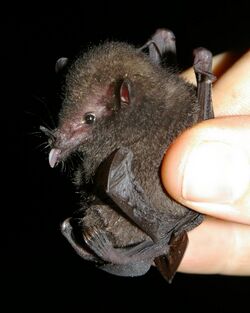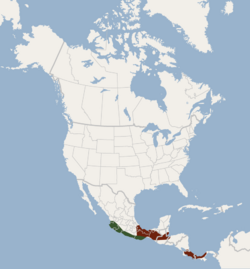Biology:Underwood's long-tongued bat
From HandWiki
Short description: Species of mammals belonging to the New World leaf-nosed bat family
| Underwood's long-tongued bat | |
|---|---|

| |
| Scientific classification | |
| Domain: | Eukaryota |
| Kingdom: | Animalia |
| Phylum: | Chordata |
| Class: | Mammalia |
| Order: | Chiroptera |
| Family: | Phyllostomidae |
| Genus: | Hylonycteris Thomas, 1903 |
| Species: | H. underwoodi
|
| Binomial name | |
| Hylonycteris underwoodi Thomas, 1903
| |

| |
Underwood's long-tongued bat (Hylonycteris underwoodi) is a species of bat in the family Phyllostomidae. It is the only species within the genus Hylonycteris. It is found in Belize, Guatemala, Mexico, Nicaragua, and Panama. Hylonycteris underwoodi feed on nectar, pollen grains, agave and fruits.[2] This choice of food has allowed them to gain the ability of hovering flight, thereby evolving their body mass and size to compensate for the same.[3]
Taxonomy
It was described as a new species in 1903 by British mammalogist Oldfield Thomas. The holotype was collected by Cecil F. Underwood, who is the eponym for the species name "underwoodi".[4]
References
- ↑ Miller, B.; Reid, F.; Arroyo-Cabrales, J.; Cuarón, A.D.; de Grammont, P.C. (2016). "Hylonycteris underwoodi". IUCN Red List of Threatened Species 2016: e.T10598A22036808. doi:10.2305/IUCN.UK.2016-3.RLTS.T10598A22036808.en. https://www.iucnredlist.org/species/10598/22036808. Retrieved 16 November 2021.
- ↑ Jones, J. Knox; Homan, Jacqueline A. (2 May 1974). "Hylonycteris underwoodi". Mammalian Species (32): 1–2. doi:10.2307/3503961.
- ↑ Voigt, C. C.; Winter, Y. (1 February 1999). "Energetic cost of hovering flight in nectar-feeding bats (Phyllostomidae: Glossophaginae) and its scaling in moths, birds and bats". Journal of Comparative Physiology B 169 (1): 38–48. doi:10.1007/s003600050191. PMID 10093905.
- ↑ Thomas, O. (1903). "XXXV.—Two new Glossophagine bats from central America". The Annals and Magazine of Natural History; Zoology, Botany, and Geology. 7 11 (63): 286–288. doi:10.1080/00222930308678766. https://biodiversitylibrary.org/page/19367833.
Wikidata ☰ Q275468 entry
 |


